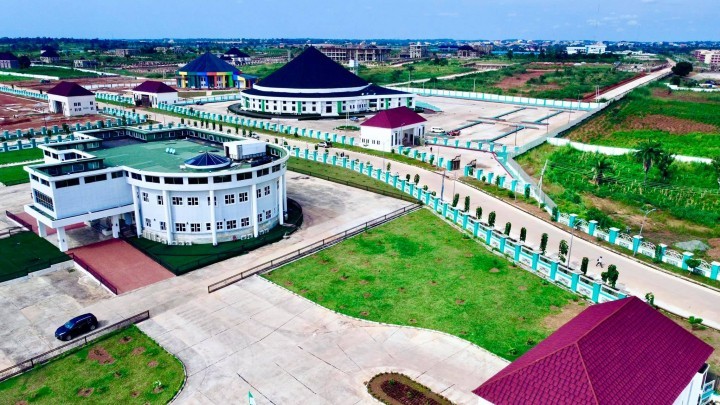The history of Ebonyi State, Nigeria, the culture, traditions and kings in the past .
- 16 Mar, 2024
- 14661 vues
Ebonyi State is one of the 36 states in Nigeria, located in the southeastern part of the country. It was created on October 1, 1996, during the military regime of General Sani Abacha, carved out from the old Enugu State. The state is known for its rich cultural heritage, diverse traditions, and historical significance.
History:
The area that now constitutes Ebonyi State has a long history dating back to pre-colonial times. It was originally inhabited by various indigenous ethnic groups such as the Igbo, Efik, and Ibibio peoples. These communities had their distinct cultures, languages, and social structures.
During the colonial era, the British established control over the region, incorporating it into the Southern Nigeria Protectorate. This led to the introduction of Western education, Christianity, and administrative structures. However, the indigenous cultures and traditions persisted despite colonial influence.
After Nigeria gained independence in 1960, the region went through various administrative changes until it became part of Enugu State. The agitation for a separate state by the people of the area eventually led to the creation of Ebonyi State in 1996, with Abakaliki as its capital.
Culture and Traditions:
Ebonyi State is renowned for its vibrant cultural heritage, which is predominantly Igbo in nature but also influenced by other neighboring ethnic groups. The Igbo culture is characterized by colorful festivals, traditional dances, art, music, and cuisine. Some of the prominent cultural festivals celebrated in Ebonyi State include the Iri Ji Festival (New Yam Festival), Mmanwu Festival (Masquerade Festival), and Ekpe Festival.
The people of Ebonyi State are known for their craftsmanship, particularly in pottery, weaving, and carving. Traditional arts and crafts play a significant role in their cultural expressions and economic activities.
Kings and Traditional Institutions:
Like many other parts of Nigeria, Ebonyi State has a rich tradition of monarchy and traditional leadership. Before colonialism, various indigenous kingdoms and chiefdoms existed in the region, each ruled by a king or traditional ruler. These traditional rulers held significant authority and played vital roles in governance, conflict resolution, and cultural preservation.
However, with the advent of colonialism and subsequent changes in governance structures, the powers and roles of traditional rulers were significantly altered. Nonetheless, traditional institutions continue to hold cultural significance and influence in Ebonyi State, with kings and traditional rulers serving as custodians of culture and tradition within their respective communities.
Some of the notable traditional rulers in Ebonyi State include the Eze of Ebonyi, Ezeogo of Ezza, Eze of Ohaukwu, and many others. These traditional rulers are highly respected by their subjects and play essential roles in maintaining peace and order, promoting cultural heritage, and fostering development within their domains.
Ebonyi State, Nigeria, offers a variety of tourist destinations that showcase its natural beauty, cultural heritage, and historical significance. Here are some notable tourist attractions in the state:
Amancho Caves: Amancho Caves are a series of interconnected limestone caves located in Amancho village, Ohaozara Local Government Area of Ebonyi State. These caves offer a fascinating exploration experience for tourists interested in geology and adventure.
Ngodo Cave and Waterfall: Ngodo Cave is a natural cave formation situated in Ngodo community, Afikpo South Local Government Area. It features stunning rock formations and a beautiful waterfall, making it a popular destination for nature lovers and adventurers.
Ezeagu Waterfalls: Ezeagu Waterfalls, also known as Iyi-Ukwu Waterfalls, is located in Akaeze community, Ivo Local Government Area. The waterfall cascades down from a rocky cliff into a serene pool, providing a picturesque setting for relaxation and recreation.
Okposi Salt Lakes: Okposi Salt Lakes, situated in Okposi community, Ohaozara Local Government Area, are natural salt deposits that have been mined by the locals for centuries. The lakes offer a unique sight and cultural experience for visitors interested in learning about traditional salt production methods.
Ebonyi State Golf Course: For sports enthusiasts, the Ebonyi State Golf Course in Abakaliki offers a scenic and challenging 18-hole golf course surrounded by lush greenery. It provides an excellent opportunity for golfers to enjoy a leisurely game in a tranquil environment.
Amanikwa Slave Market: Amanikwa Slave Market is a historical site located in Afikpo North Local Government Area. It served as a major trading hub for the transatlantic slave trade during the colonial era. Today, the site serves as a memorial to commemorate the victims of the slave trade and educate visitors about this dark period in history.
Ebonyi State Museum: The Ebonyi State Museum, located in Abakaliki, houses a collection of artifacts, traditional crafts, and historical items that depict the cultural heritage and history of the state. It provides visitors with insights into the rich cultural diversity and traditions of Ebonyi State.
Ezeudo Cultural Centre: Ezeudo Cultural Centre, situated in Ezza North Local Government Area, is a cultural hub where traditional festivals, dances, and ceremonies are showcased. Visitors can experience the vibrant culture of the Ezza people through various cultural performances and exhibitions.
In Ebonyi State, as in many parts of Nigeria, food and family life are integral aspects of the culture, shaping daily routines, social interactions, and celebrations. Here's a glimpse into food and family life in Ebonyi State:
Food:
Traditional Cuisine: Ebonyi State boasts a rich culinary heritage, with traditional dishes that are deeply rooted in the local culture. Staple foods include cassava, yam, plantains, rice, and various types of vegetables.
Local Delicacies: Some popular local delicacies in Ebonyi State include:
Bitterleaf Soup (ofe onugbu): A traditional Igbo soup made with bitterleaf, assorted meats, and spices.
Abacha (African Salad): A tasty salad made from shredded cassava, vegetables, and seasonings.
Nkwobi: Spicy cow foot or goat meat delicacy often served as a side dish or appetizer.
Ukwa: African breadfruit porridge typically cooked with palm oil, crayfish, and other ingredients.
Ofe Akwu: A delicious palm nut soup commonly enjoyed with fufu or pounded yam.
Street Food: Street food vendors are a common sight in Ebonyi State, offering a variety of snacks and quick meals such as roasted plantains (bole), roasted corn, akara (bean cakes), and suya (grilled meat skewers).
Family Life:
Strong Family Bonds: Family plays a central role in Ebonyi State's society, with strong bonds between relatives and extended family members. Family gatherings are frequent, providing opportunities for socializing, sharing meals, and celebrating special occasions together.
Respect for Elders: Respect for elders is a fundamental value in Ebonyi State's culture. Children are taught to honor and obey their parents and older relatives, and elders are highly esteemed for their wisdom and experience.
Gender Roles: Traditional gender roles are still prevalent in many families in Ebonyi State, with women often responsible for household chores and childcare, while men are typically the breadwinners. However, there's an increasing awareness of gender equality, and many families are evolving to embrace more egalitarian dynamics.
Education: Education is highly valued in Ebonyi State, and families prioritize their children's academic success. Parents often make significant sacrifices to ensure their children receive a quality education, believing it offers opportunities for a better future.
Religious Practices: Religion plays a significant role in family life, with Christianity being the dominant faith in Ebonyi State. Families often participate in religious activities together, such as attending church services, prayer meetings, and religious festivals.
In conclusion, Ebonyi State boasts a rich history, diverse culture, and strong traditional institutions that reflect the resilience and heritage of its people. Despite modernization and socio-political changes, the cultural identity and traditions of the various ethnic groups in the state continue to thrive, contributing to the colorful tapestry of Nigerian society.
As of my last update in January 2022, the population of Ebonyi State was estimated to be around 4 million people. However, please note that population figures may have changed since then due to factors such as birth rates, migration, and other demographic dynamics.
Here is a list of towns and local government areas (LGAs) in Ebonyi State:
- Local Government Areas:
Abakaliki
Afikpo North
Afikpo South
Ebonyi
Ezza North
Ezza South
Ikwo
Ishielu
Ivo
Izzi
Ohaozara
Ohaukwu
Onicha
- Towns and Cities:
Abakaliki (Capital city)
Afikpo
Onueke
Ishiagu
Ezzamgbo
Edda
Uburu
Unwana
Nkalagu
Amasiri
Ezillo
Uburu
Isu
Agba
Okposi
Uburu
Nkalagu
These are just some of the major towns and local government areas in Ebonyi State. The state is known for its diverse communities, each with its unique cultural heritage and traditions.
- Catégorie:
- Arts & Culture
- Écrit par:
- Tolu
- Téléphone:
- +34 631 27 98 11
- Pas de commentaires



